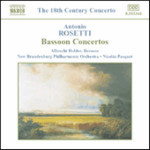
Bassoon Concertos
 $25.00
Out of Stock
$25.00
Out of Stock6+ weeks add to cart
ANTONIO ROSETTI
Bassoon Concertos
Albrecht Holder (Bassoon) / New Brandenburg Philharmonic Orchestra / Nicolas Pasquet
[ Naxos / CD ]
Release Date: Friday 30 November 2007
This item is currently out of stock. It may take 6 or more weeks to obtain from when you place your order as this is a specialist product.
"What joy to hear the bassoon concerti of Mozart's contemporary, Antonio Rosetti! These works (he wrote five) give the bassoon all the virtuosity of any woodwind, not apologizing at all for its unique tone but fully exploiting its range and sensitivities." INFODAD.com, July 2003
"Not all woodwinds are equal in concerti and chamber music. The bassoon has been called the clown of the orchestra, relegated to bubbly sounds beneath other winds and granted an occasional brilliant solo work, such as Mozart's Bassoon Concerto. So what joy to hear the bassoon concerti of Mozart's contemporary, Antonio Rosetti! These works (he wrote five) give the bassoon all the virtuosity of any woodwind, not apologizing at all for its unique tone but fully exploiting its range and sensitivities. Three of the four concerti played excellently by Albrecht Holder have never been recorded before, and all have wonderful moments. Most cohesive and interesting is number C69 in the Murray catalogue of Rosetti's works: themes flow naturally and virtuosity is at their service. Murray C73 has an especially elaborate solo part in the first movement. Murray C75 is unusual for its key - F major (all the other concerti here are in B-flat) - and for a finale in duple rather than 6/8 meter. Murray C74, the only concerto previously recorded, begins with an orchestral tutti that sounds astonishingly like Mozart, though the solo part is somewhat less interesting. All these fine works deserve to be better known."
- INFODAD.com, July 2003
Under the rule of Prince Kraft Ernst (1748-1802) the court musical establishment of Oettingen-Wallerstein in Swabia enjoyed two periods of remarkable success. The first of these was during the opening years of his rule from 1773, unfortunately only three short years, since, after the unexpectedly early death of the Princess, the widower was for a long time in mourning and did not want to hear any music. The second, a longer period, was from 1780. The Prince had taken the Mannheim orchestra, famous throughout Europe, as his model and generally had distinguished and well-known players recruited: the list of musicians in his Kapelle in the 1770s and 1780s and the visiting soloists of this period read like a Who's Who of the musical world of the times of Haydn and Mozart. This is true particularly of the horn-players, among whom Johann Türrschmidt (1725-1800), Johann Georg Nisle (1731-1788), Joseph Nagel (1751/2-1802) and Franz Zwierzina (1751-1825) were among the best known European virtuosi of the time.
Antonio Rosetti was probably born Anton Rös[s]ler in Litomeùrùice (Leitmeritz) about 1750. His first years are obscure, but in 1773 he had his first fixed employment in Wallerstein as livery servant and double bass player. From then onwards using only the Italian form of his name, he found there a court musical establishment of very good musicians, soon regarded as one of the best ensembles in Europe, as a number of reports witness, and one that in the 1780s had a gifted complement of some thirty players. Rosetti very soon began to compose symphonies, concertos and chamber music for the orchestra and its soloists, but also for employers elsewhere. Appointed Kapellmeister in 1785, he wrote chamber music especially for the woodwind and brass players of the court establishment, both the ever increasingly popular Harmoniemusik, music for wind ensemble, as well as for other instrumental combinations. Among these are, as far as we know, the earliest wind quintets in the history of music.
With the death of the Kapellmeister Carl August Westenholz (1736-1789) at the court of the Duke of Mecklenburg-Schwerin in Ludwigslust, there arose a vacancy for which Rosetti applied, since he was suffering ill-health and was no longer happy with the material conditions of his work. As the Prince had great difficulty in financing his expensive musical establishment, Rosetti's requests for an increase in his salary were in vain. He was given the position, which brought him three times his Wallerstein salary. There was also in Ludwigslust an efficient court Kapelle of 29 distinguished musicians and a choir of twelve full-time court singers. It was here that Rosetti wrote, in addition to instrumental works, a number of splendid choral works. Meanwhile his reputation had spread throughout Europe, with performances of his compositions and often favourable comparison with those of Mozart or Haydn. A Requiem that he had written in 1776 in Wallerstein was performed in Prague nine days after the death of Mozart as a tribute to the latter, with 120 performers and an audience of four thousand. Rosetti was invited by Friedrich Wilhelm II of Prussia to Berlin, where he performed choral works, but returned ill and shortly afterwards, only 42 years old, he died, on 30th June 1792.
Tracks:
Bassoon Concerto in B flat major (Murray, C73)
Bassoon Concerto in B flat major (Murray, C69)
Bassoon Concerto in F major (Murray C75)
Bassoon Concerto in B flat major (Murray, C74)
